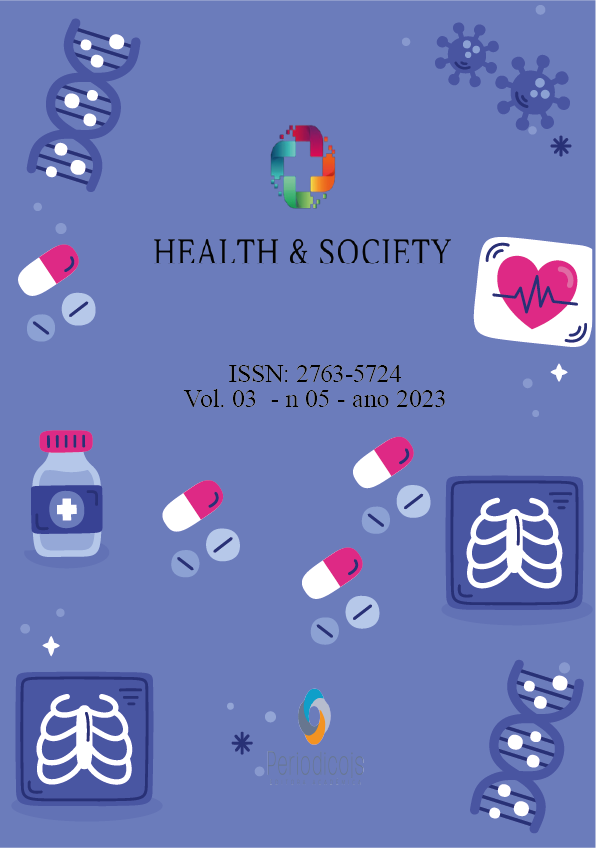Resumo
This article aims to report the personal experience of the crew of the Mobile Intensive Care Unit – ICU, of a private company, in the center-west region of the state of Minas Gerais. The method used is the report of experiences lived in the last 15 months. It was noticed that the body mass index - BMI, was often not prioritized during removal requests in patients using an orotracheal tube in obese patients, as the majority of ventilators available on the market do not ventilate morbidly obese patients, generating a risk of barotrauma in bag-mask-valve ventilation. This generated in the institution a new protocol for assistance and reception by the attendant when it comes to intubated patients. As it is an Intensive Care Unit (mobile ICU) environment, it requires numerous prevention, stabilization and health promotion actions for the individual to be transported. This is a highly vulnerable vehicle for patients in transit and for the car’s crew. The article leads to reflection on the topic, providing the opportunity to have a broader view when it comes to transporting an obese patient. Despite being very specific and qualified assistance, the importance of disseminating information could awaken the community in general, as any human being could one day need this care and this type of transport. Among the ways to prevent transport complications, the measures taken include improving communication from the team leaving the support base until receiving the patient in the specialized bed with the best support.
Referências
Brasil. MS. NBR 14561 de 07/2000 – Veículos para atendimento a emergências médicas e resgate. https://www.gov.br/anvisa/pt-br/assuntos/paf/regulamento-sanitario-internacional/arquivos/7203json-file-1 Acesso em 21/09/2023.
BRASIL. Agência Nacional de Vigilância Sanitária (ANVISA). Medidas de prevenção de infecção relacionada à assistência à saúde. Brasília (DF): ANVISA; 2017. Disponível em: https://www.gov.br/anvisa/pt-br Acesso em: 02 out. 2022.
BELONCLE, F. M. et al. Advanced respiratory mechanics assessment in mechanically ventilated obese and non-obese patients with or without acute respiratory distress syndrome. Critical Care, v. 27, n. 1, 4 set. 2023
COSTA, G. S. et al. Cuidados de Enfermagem na Prevenção da Pneumonia Associada à Ventilação Mecânica. Revista Ciência Plural; 7(3):272-289, 2021.
DUTRA L.A. et al. Pneumonia associada à ventilação mecânica: percepção dos profissionais de enfermagem. Rev. enferm. UFPE on line 2019; 13(4):884-92.
CFM, 2017 – Parecer 52/2017. Transporte Inter-hospitalar de pacientes. https://sistemas.cfm.org.br/normas/arquivos/pareceres/RO/2017/52_2017.pdf Aceddo em 21/09/2023.
MELO, M.M. et al. Pneumonia Associada à Ventilação Mecânica: Conhecimento dos Profissionais de Saúde Acerca da Prevenção e Medidas Educativas. Rev Fund Care, v.11, n. esp, p:377-382, 2019.
MURPHY, C.; WONG, D. T. Airway management and oxygenation in obese patients. Canadian Journal of Anesthesia/Journal canadien d’anesthésie, v. 60, n. 9, p. 929–945, 9 jul. 2013.
PRÉCOMA D. B., et al. Atualização da Diretriz de Prevenção Cardiovascular da Sociedade Brasileira de Cardiologia – 2019. Arq Bras Cardiol. 2019; [online]. ahead print, PP.0-0.
ROCHA, Raphael Grossi; BONI, Carlos Leonardo Alves; BOAS, Walkiria Wingester Vilas. Ventilation and difficulties related to obesity. Revista Médica de Minas Gerais, [S.L.], v. 24, n. 8, p. 11-18, 2014.
SANT’ANNA JR, M. DE et al. Mecânica respiratória de pacientes com obesidade mórbida. Jornal Brasileiro de Pneumologia, v. 45, n. 5, 2019.
WANDERLEY, Emanuela Nogueira; FERREIRA, Vanessa Alves. Obesidade: uma perspectiva plural. Ciencia e Saude Coletiva, Diamantina, v. 15, n. 1, p. 185-194, 2010.
ZIGART, J. A. A. et al. Adesão ao protocolo de pneumonia associado à ventilação mecânica. Rev enferm UFPE on line; 13(1): 655-63, 2019. Disponível em: Adesão ao protocolo de pneumonia associado à ventilação mecânica | Rev. enferm. UFPE on line;13(3): 655-663, mar. 2019.

Este trabalho está licenciado sob uma licença Creative Commons Attribution 4.0 International License.
Copyright (c) 2023 Fernanda de Freitas Ferreira, Laís Campos Gontijo, Laís Leão Calumby, Letícia Almeida Honorato





